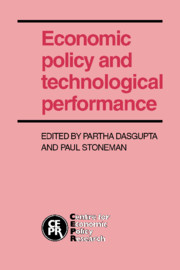Book contents
- Frontmatter
- Contents
- List of tables
- List of figures
- Preface
- List of participants
- Introduction
- 1 The economic theory of technology policy: an introduction
- 2 Current policy practice and problems from a UK perspective
- 3 The importance of technology policy
- 4 The value of patents as indicators of inventive activity
- 5 Learning to learn, localized learning and technological progress
- 6 Some analytical observations on diffusion policies
- 7 International trade and technology policy
- 8 Some new standards for the economics of standardization in the information age
- Index
7 - International trade and technology policy
Published online by Cambridge University Press: 17 September 2009
- Frontmatter
- Contents
- List of tables
- List of figures
- Preface
- List of participants
- Introduction
- 1 The economic theory of technology policy: an introduction
- 2 Current policy practice and problems from a UK perspective
- 3 The importance of technology policy
- 4 The value of patents as indicators of inventive activity
- 5 Learning to learn, localized learning and technological progress
- 6 Some analytical observations on diffusion policies
- 7 International trade and technology policy
- 8 Some new standards for the economics of standardization in the information age
- Index
Summary
‘Compare the situation of Great Britain at present, with what it was two centuries ago. All the arts, both of agriculture and manufacturers, were extremely rude and imperfect. Every improvement, which we have since made, has arisen from our imitation of foreigners; and we ought so far to esteem it happy, that they had previously made advances in arts and ingenuity … The commodity is first imported from abroad, to our great discontent, while we imagine that it drains us of our money: afterwards, the art itself is gradually imported, to our visible advantage: yet we continue still to repine, that our neighbours should possess any art, industry, and invention: forgetting that, had they not first instructed us, we should have been at present barbarians; and did they not still continue their instructions, the arts must fall into a state of languor, and lose that emulation and novelty which contribute so much to their advancement’ (David Hume, 1758).
’ … it may be laid down as a general Proposition, which very seldom fails, That operose or complicated Manufactures are cheapest in rich Countries; – and raw Materials in poor ones … No Man can set Bounds to Improvements even in Imagination; and therefore, we may still be allowed to assert, that the richer manufacturing Nation will maintain its Superiority over the poorer one, notwithstanding this latter may be likewise advancing towards Perfection.’ (Reverend Josiah Tucker, 1758; as quoted in Hufbauer, 1970).
- Type
- Chapter
- Information
- Economic Policy and Technological Performance , pp. 169 - 205Publisher: Cambridge University PressPrint publication year: 1987



